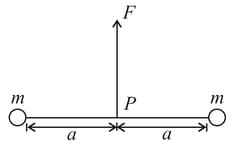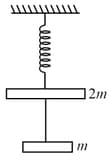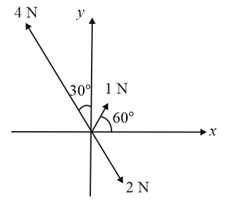Newton's Laws of Motion
Newton's Laws of Motion: Overview
This topic covers concepts such as balanced forces, unbalanced forces, and first law of motion.
Important Questions on Newton's Laws of Motion
A lift weighing is moving upwards with an acceleration of . The tension in the supporting cable is
If a cricketer catches a ball of mass moving with a velocity of , then he experiences a force of (Time taken to complete the catch is )
A monkey is descending from the branch of a tree with constant acceleration. If the breaking strength is 75% of the weight of the monkey, the minimum acceleration with which monkey can slide down without breaking the branch is
Two particles of mass each are tied at the ends of a light string of length The whole system is kept on a frictionless horizontal surface with the string held tight so that each mass is at a distance from the centre (as shown in the figure). Now, the mid-point of the string is pulled vertically upwards with a small but constant force As a result, the particles move towards each other on the surface. The magnitude of acceleration, when the separation between them becomes is

The string between blocks of mass and is massless and inextensible. The system is suspended by a massless spring as shown. If the string is cut find the magnitudes of accelerations of mass and (immediately after cutting)

A block of mass is placed on a horizontal frictionless plane. A second block of mass is placed on it and is connected to a spring of spring constant the two blocks are pulled by distance . Block oscillates without slipping. What is the maximum value of frictional force between the two blocks?

Three identical blocks of masses are drawn by a force on a frictionless surface, then what is the tension (in ) in the string between the blocks and ?

A particle of mass is subjected to a force with . What will be its initial acceleration if it is released from a point away from the origin?
A machine gun fires a bullet of mass 40 g with a velocity 1200 . The man holding it can exert a maximum force of 144 N on the gun. How many bullets can he fire per second at the most?
A rocket with a lift-off mass is blasted upwards with an initial acceleration of . Then the initial thrust of the blast is nearly –
A light spring balance hangs from the hook of the other light spring balance and a block of mass hangs from the former one. Then the true statement about the scale reading is –
If suddenly the gravitational force of attraction between earth and a satellite revolving around it becomes zero, then the satellite will –
State Newton's first law of motion.
Three forces acting on a body are shown in the figure. To have a resultant force only along the , the magnitude of the minimum additional force needed is:

The rough surface of a horizontal table offers a definite maximum opposing force to initiate the motion of a block along the table, which is proportional to the resultant normal force given by the table. Forces and act at the same angle with the horizontal and both are just initiating the sliding motion of the block along the table. Force is a pulling force while the force is a pushing force. , because
Consider following forces: Force due to tension along a string, Normal force given by a surface, Force due to air resistance and Buoyant force or upthrust given by a fluid. Which of these are electromagnetic forces?
A bullet of mass moving with a speed of enters heavy wooden block and is stopped after a distance of . What is the average resistive force exerted by the block on the bullet . The value of is
A small spherical ball (obeying Stoke's law for viscous force) is thrown up vertically with a speed and is received back by the thrower at the point of projection with a speed . Neglecting the buoyant force on the ball, assuming the speed of the ball during its flight to be never equal to its terminal speed and taking the acceleration due to gravity , find the time of flight of the ball in seconds.
The momentum of a system of particles is always conserved. True or false?
Can a single isolated force exist in nature? Explain your answer.
